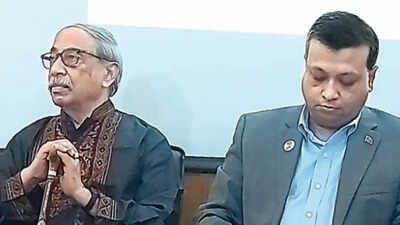Top Searches
- News
- City News
- kolkata News
- Seminar focuses on Mujib’s vision of Indo-Bangla ties
Seminar focuses on Mujib’s vision of Indo-Bangla ties

Shahriyar Kabir, Bangladeshi human rights activist, with Andalib Elias, Deputy High Commissioner of Bangladesh to Kolkata (R)
KOLKATA: Bangladeshi human rights activist Shahriar Kabir stressed the significance of Bangabandhu’s vision for India-Bangladesh ties, of a globalised Sonar Bangla, which is devoid of sectarianism and religious or caste-based violence, at a seminar on Mujibur Rahman’s political philosophy. The seminar was organised at Presidency University to mark the centenary of Bangabandhu’s birth anniversary on Wednesday .
During the seminar, Kabir’s most recent documentary “Hakan’s journey to Peace” was screened. Commenting on the essence of the film, Kabir said: “Despite the efforts of removing religion from politics, we see it continue and manifest in exclusionary and violent ways.

Bangabandhu was not against the practice of religion, but rather espoused a soft secularism, in which there is religious tolerance. Pakistani and colonial ideology tried to teach us to think of Indians and Bangladeshis as inherently different, but visionaries like Bangabandhu taught us to believe that even though artificial borders have been created between us, Hindus and Muslims of Bengal and Bangladesh are the same in heart and spirit.”
Deputy High Commissioner of Bangladesh in Kolkata, Andalib Elias, who was present at the seminar, said: “Bangabandhu was neither a communist nor a capitalist or anything in between. He had a unique political philosophy of his own, which was way ahead of his time. In as early as 1974, when Bangladesh joined the UN, he talked about sustainable development and climate change.”
Presidency University dean of humanities and social sciences, Sumit Chakravarti, said: “In Bengal we recall Bangladesh with love and nostalgia. While holding onto this love, we must contextualise the ties between our countries in a global perspective. Mujibur Rahman’s unique political philosophy can help pave the way for global recognition and combined potential for our two countries.”
The organiser of the seminar, Tapas Das, who researches at Presidency University on Indo-Bangla relations, said: “Backed by the philosophy of Mujibur Rahman, Bangladesh became the first post-colonial country in the world to adopt the words socialist and secular in its constitution in 1972. Although he espoused secularism, he did not want to obliterate religion from society.”
During the seminar, Kabir’s most recent documentary “Hakan’s journey to Peace” was screened. Commenting on the essence of the film, Kabir said: “Despite the efforts of removing religion from politics, we see it continue and manifest in exclusionary and violent ways.

Bangabandhu was not against the practice of religion, but rather espoused a soft secularism, in which there is religious tolerance. Pakistani and colonial ideology tried to teach us to think of Indians and Bangladeshis as inherently different, but visionaries like Bangabandhu taught us to believe that even though artificial borders have been created between us, Hindus and Muslims of Bengal and Bangladesh are the same in heart and spirit.”
Deputy High Commissioner of Bangladesh in Kolkata, Andalib Elias, who was present at the seminar, said: “Bangabandhu was neither a communist nor a capitalist or anything in between. He had a unique political philosophy of his own, which was way ahead of his time. In as early as 1974, when Bangladesh joined the UN, he talked about sustainable development and climate change.”
Presidency University dean of humanities and social sciences, Sumit Chakravarti, said: “In Bengal we recall Bangladesh with love and nostalgia. While holding onto this love, we must contextualise the ties between our countries in a global perspective. Mujibur Rahman’s unique political philosophy can help pave the way for global recognition and combined potential for our two countries.”
The organiser of the seminar, Tapas Das, who researches at Presidency University on Indo-Bangla relations, said: “Backed by the philosophy of Mujibur Rahman, Bangladesh became the first post-colonial country in the world to adopt the words socialist and secular in its constitution in 1972. Although he espoused secularism, he did not want to obliterate religion from society.”
FOLLOW US ON SOCIAL MEDIA
FacebookTwitterInstagramKOO APPYOUTUBE
Start a Conversation
end of article









